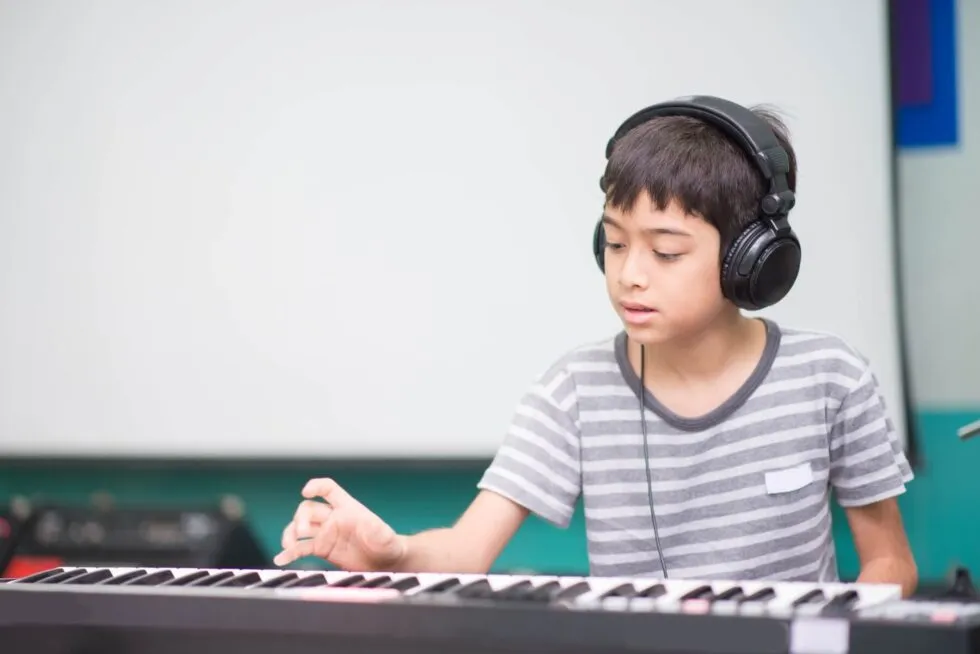Emmett lives in the midwestern U.S. with his dad Rob and his older brothers Elliott and Gavin. Emmett is a great problem-solver with a brilliant mind. His dad describes him as “so articulate you wouldn’t know he’s 11. He sounds twice his age.” Emmett has Autism Spectrum Disorder (ASD) and has struggled with emotional dysregulation from a young age. When he was 9, Emmett’s dad asked him to try Mightier to see if it could help Emmett with frustration management.
Emmett was considered nonverbal for the first 4 years of his life. Medical providers suspected that he might have hearing impairments, but screenings had been mostly normal. When Emmett was 3 his family noticed that he did not startle in reaction to loud noises. A new round of tests showed that Emmett was able to hear, but that he was tuning out his family, which led providers to screen for and eventually diagnose Emmett with ASD. When Emmett was 4, his parents got him a puppy for companionship, which was a turning point for him verbally and in terms of some of his more extreme sensory challenges. Though Emmett could not tolerate dirt at that age — on his clothes, on his shoes — he started going outside to play with the puppy, even when the puppy was rolling around in the dirt. Emmett also became verbal after the puppy arrived, in a short period of time going from barely speaking any words to speaking in full sentences.
From the time he was a toddler, Emmett was very easily frustrated. Many of his most frustrated moments were related to his extreme difficulties expressing himself. Emmett did not try to hurt people during outbursts. But when he was at his worst, he would lash out and get aggressive. Emmett’s preschool was not well-equipped to help him with the challenges he was facing, which was very stressful for everyone involved and eventually led to his family removing him from the school. In Kindergarten, Emmett started attending a school for autistic children, and since then his behaviors at school have not been as problematic. But at home, and out in the community with his family, Emmett’s frustration management continued to be a problem. Emmett has always been surrounded and supported by a large and loving family. His dad says, “Everybody loves him to pieces.” Emmett’s older brothers have experienced similar challenges in their lives, so they have always been able to relate to him easily. Still, his loved ones were often on edge, wondering when his next explosive episode was going to happen. Emmett rarely noticed when he was getting upset until it was too late, so his rages were unpredictable and difficult for everyone to handle.
Emmett’s dad Rob has created a blog about his experiences parenting three sons with autism spectrum disorders. When Emmett was 9, Mightier asked Rob to try Mightier and write a review from the perspective of a parent of kids on the autism spectrum. Rob was hesitant at first — he hears from lots of companies that want him to try their products. But the more he thought about it, the more it seemed like it could be a good fit for Emmett, who loves video games and who has always been fascinated with the heart rate monitor that Rob wears on his watch. Rob decided to give it a try.
“The big thing is it improves the quality of life for the child in question. It helps your child to be happier.”
At first Rob was skeptical of Mightier, thinking “there is no way this works. It’s too easy.” But he found that the simplicity was working for Emmett. Rob noticed that Emmett picked up on the mechanics of Mightier gameplay quickly, connecting the dots between what was happening with the gizmo – Mightier’s on-screen heart rate gauge – and the shifting difficulty of the games. From there, it didn’t take Emmett long to correlate how he was feeling with how it impacted the game. As soon as he figured that out, it became something he focused on. Rob notes that Emmett was a big fan of one game that was particularly frustrating. If Emmett got frustrated while he was playing it got even harder to play. He understood this dynamic, so when his heart rate was elevated while playing, he immediately knew that he needed to calm down. “His mission was to play the game, and it became a process for him.”
Though he very quickly became skilled at calming while playing Mightier, it took some time before Emmett’s family saw him use Mightier skills away from the game. Eventually, Rob says “you could see the gears turning. He would just stop, and put his hands out, and he would just take a breath.” Especially early on, taking a deep breath did not always work for Emmett, but Rob thought, “Hey, that’s amazing … because even if that just gives us a few more seconds of non-exploding Emmett, it gives us an opening to teach him some other coping skills.” Before playing Mightier, Emmett did not realize he was getting upset until it was too late. Mightier gave him the ability to recognize that he was getting upset before he hit the threshold and understand how that impacted his decision-making. In doing so, it opened a door for his family to be able to teach him the skills that he needed beyond that.
Rob describes Mightier as “brilliantly simple. You’re using what they’re already interested in and helping them learn to manage their emotions better. … For years it wasn’t clicking, then he started playing Mightier, and it clicked.” Rob acknowledges that every kid is different and the Mightier process might be different for everybody. But for families that are willing to put in the work of finding a regular play routine, he thinks it’s worth a shot. Rob has seen Mightier improve Emmett’s quality of life, which has rippled out into quality of life improvements for the whole family. “I’m not so worried. I’m not so stressed out. We can do more things as a family. … The big thing is it improves the quality of life for the child in question. It helps your child to be happier. Do it for your kid- everyone else will benefit from it.”
You can read more about Emmett, Rob, and their family life at theautismdad.com.


















